Why every day is like the Kentucky Derby for Churchill Downs' equine veterinarians
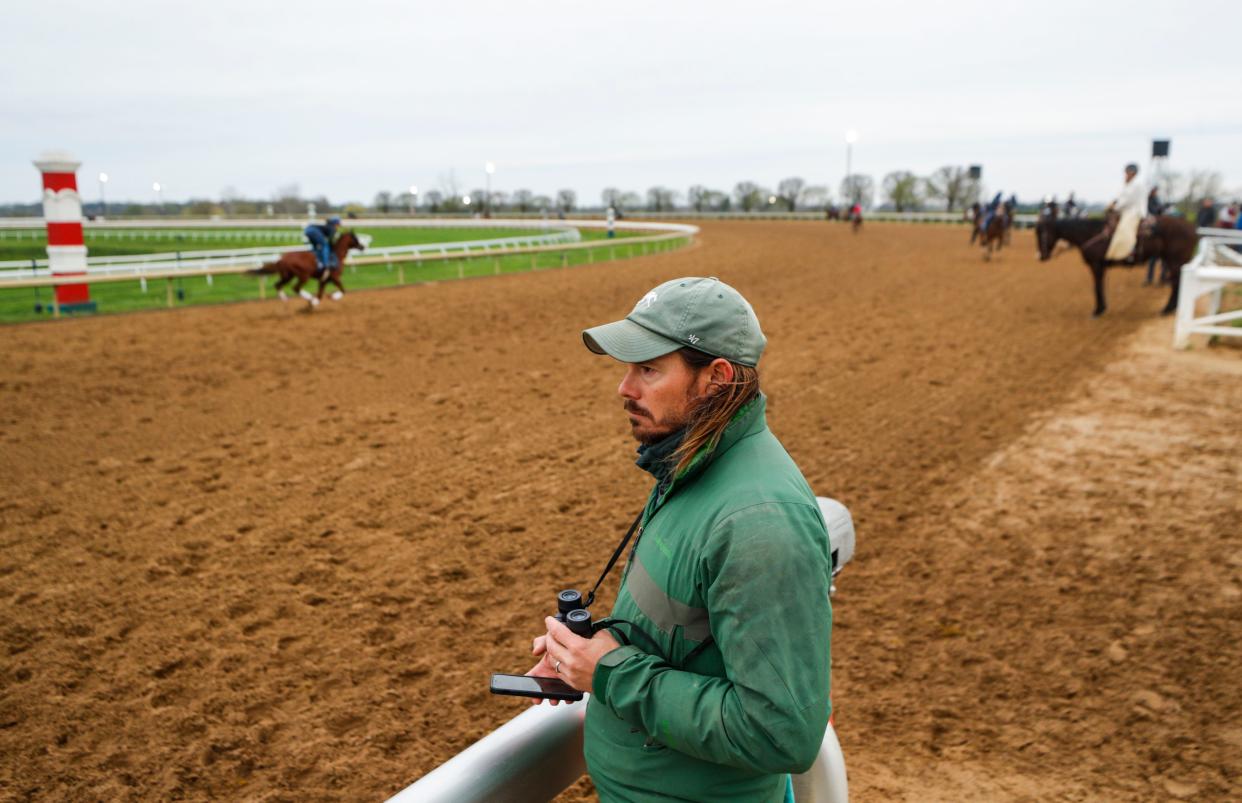
While veterinarians are recruited from across the country to help with the prized horses that compete during the Kentucky Derby, the state suffers from a massive vet shortage that continues to impact the state's horse population.
The death of seven horses leading up to the post time for the 2023 Kentucky Derby, coupled with a slew of additional horse deaths at Churchill Downs that followed the Derby, put veterinarians and the safety of the equine industry in the spotlight. The spate of deaths prompted the industry to add safety technology and checks performed by vets at racetracks in Kentucky, which increased the workload of an already short-staffed profession.
The veterinarian shortage has been growing for decades as more medical professionals seek careers that provide better work-life balance, more sustainable pay, and require significantly less student loan debt to enter the field. Nationwide, 3,785 vets exclusively practice on horses, according to a 2024 study by the American Association of Equine Practitioners and the American Veterinary Medical Association. In Kentucky, 353 registered vets spend at least 70% of their time with equine patients, according to data provided to The Courier Journal by the Kentucky Department of Agriculture.
But experts like Dr. Stuart Brown, vice president of equine safety at Keeneland over sales and racing, say there are not enough practitioners to care for the nearly 210,000 horses that call Kentucky home, according to a 2022 Equine Survey, let alone the influx of horses that travel to the state for meets and races at various tracks.
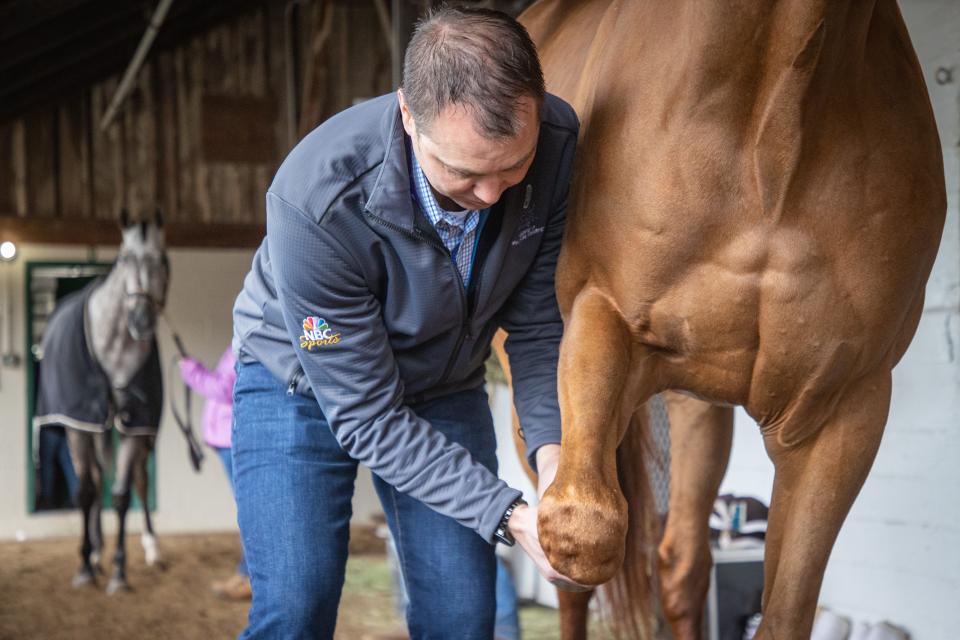
On a typical race day, vets may see more than 100 horses at places like Churchill Downs or Keeneland.
Dr. George Mundy, interim equine medical director with the Kentucky Horse Racing Commission, the state regulatory oversight body for the racing industry, said for races like the Kentucky Derby, equine vets are recruited from around the country to assist with the additional logistical and care needs, which are held to the same standard, whether it's a high-profile racehorse like 2023 Kentucky Derby winner Mage or an aging thoroughbred that never brought in a single dollar.
"When it comes to safety, every day is Derby Day," Mundy said.
And while the 2023 spotlight has helped improve some aspects of the shortage, including more equitable pay and additional training programs, there's lots of work to be done.
“This [vet shortage] kind of extends beyond the racing world, but it definitely hits us very hard,” said Dr. Will Farmer, equine medical director for Churchill Downs, Inc. “It's a struggle day to day for the racetracks.”
'Every day is Derby day'
An investigation by the Horseracing Integrity and Safety Authority determined the horse deaths were not attributable to a single cause, but highlighted the need for more equine veterinarians in Kentucky and nationwide. In response, the industry further encouraged wearable technologies such as StrideSAFE, and things like better track maintenance and other risk assessment tools to help monitor horse health, Brown told the Courier Journal.
While these safety investments are key to protecting horses, Brown said it creates another aspect of learning and application for vets — adding more tasks to a lengthy daily to-do list for a small number of practitioners. Since 2018, the Lexington-based AAEP has observed a 25% decline in membership across Kentucky, which reflects the dwindling number of equine vets in the state.
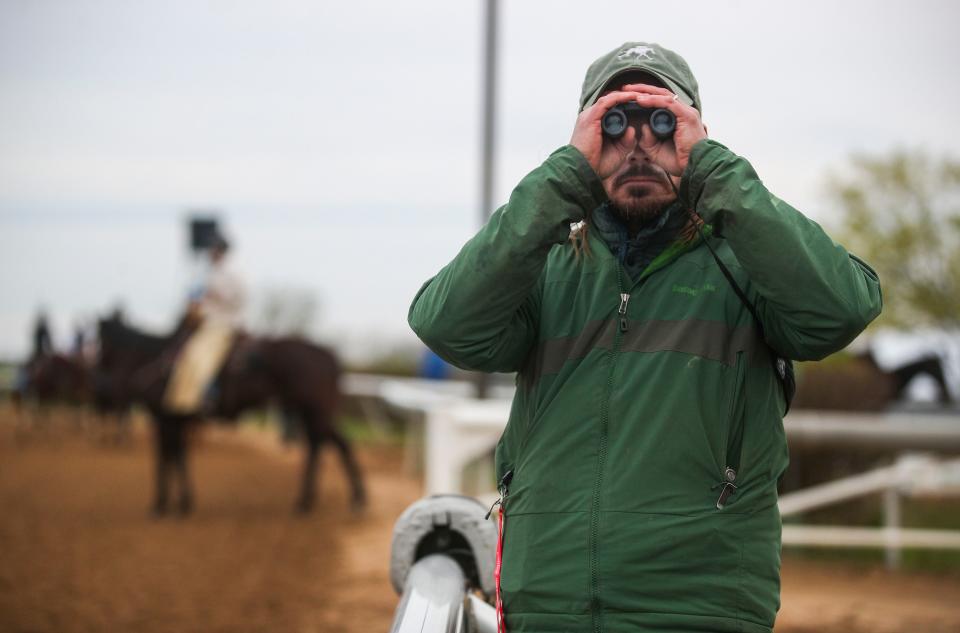
That extra help is welcome during the busy season when equine veterinarians work with thousands of horses in shifts that surpass a traditional eight-hour workday. But it doesn’t solve the bigger issue plaguing equine vets. In the past three years full-time, equine veterinarians have clocked more hours than their companion animal vet peers, according to the 2024 AAEP and AVMA industry study. averaging 56 working hours per week.
In an industry that demands around-the-clock availability, it can be difficult, if not impossible, to establish a work-life balance. The AAEP and AVMA study found that 58% of all equine vets nationwide attributed poor work-life balance as a main contributor to thinking about leaving the field.
AAEP President Dr. Katie Garrett said this level of demand takes a toll on people, regularly interrupting daily life and often leading to burnout.
"I mean, it's the kid's soccer games, it's the dinners, it's Christmas, it's all of that sort of stuff that you are constantly getting pulled away from," Garrett said.
Farmer, with Churchill Downs, said that while the veterinary industry continues to experience a shortage, it leaves those left to work “harder and longer to make sure that the animals are taken care of.”
Despite the less-than-ideal attention drawn to the industry following the 2023 horse deaths, Farmer says there’s a “potential silver lining” with the increased visibility.
"I'm hopeful that ultimately will help us long term in the recruitment of veterinarians because there are people who want to help solve this problem,” Farmer told the Courier Journal. “We just need talented, qualified individuals to join our portion of the veterinary industry."
What is a typical day for an equine vet at a racetrack?
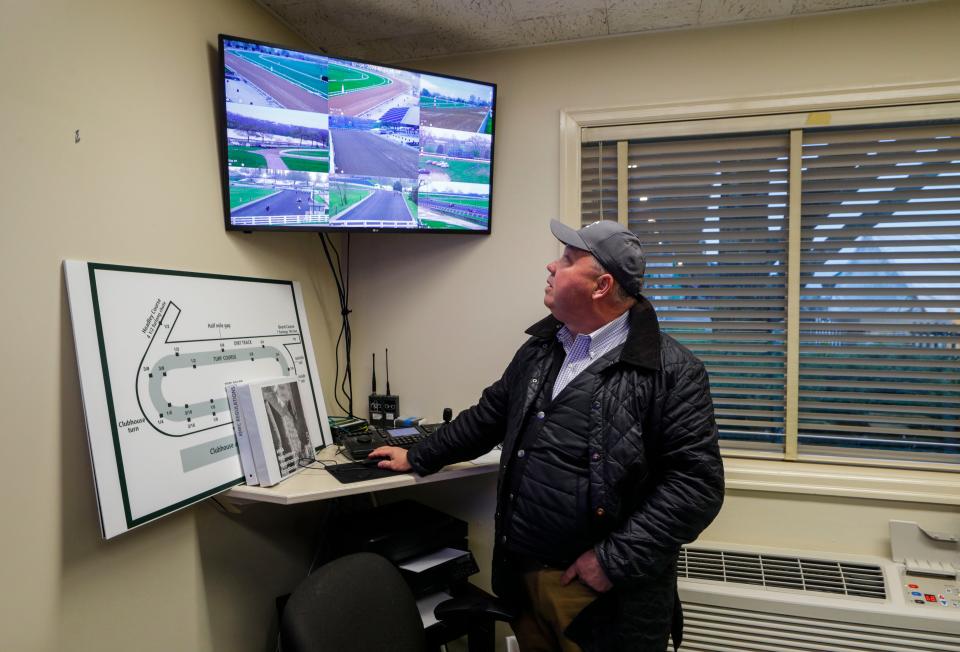
Race days at Keeneland in Lexington or Churchill Downs in Louisville are often all-day affairs focused on betting, fashion, and food.
For veterinarians like Brown, it’s an all-day affair, too, but it’s far from glamourous.
By 5:30 a.m. when the racetrack opens during a typical day at Keeneland’s Spring Meet, Brown has already been working for hours, analyzing videos and medical notes of the hundreds of racehorses, watching morning workouts, and surveying the health of the horses both trackside and using the "Vet Cam" system, a state-of-the-art video monitoring system that allows veterinarians to see every angle of every horse while on the track.
At some point in the morning, between workouts and meetings, the racing regulatory veterinarians with the Kentucky Horse Racing Commission, part of the state's Public Protection Cabinet, perform physical exams for each horse on the opening day race card. Brown said for the 10 days leading up to opening day, the veterinarians perform “hundreds to thousands of exams daily.”
And the problems in the industry stretch well beyond the state's racetracks.
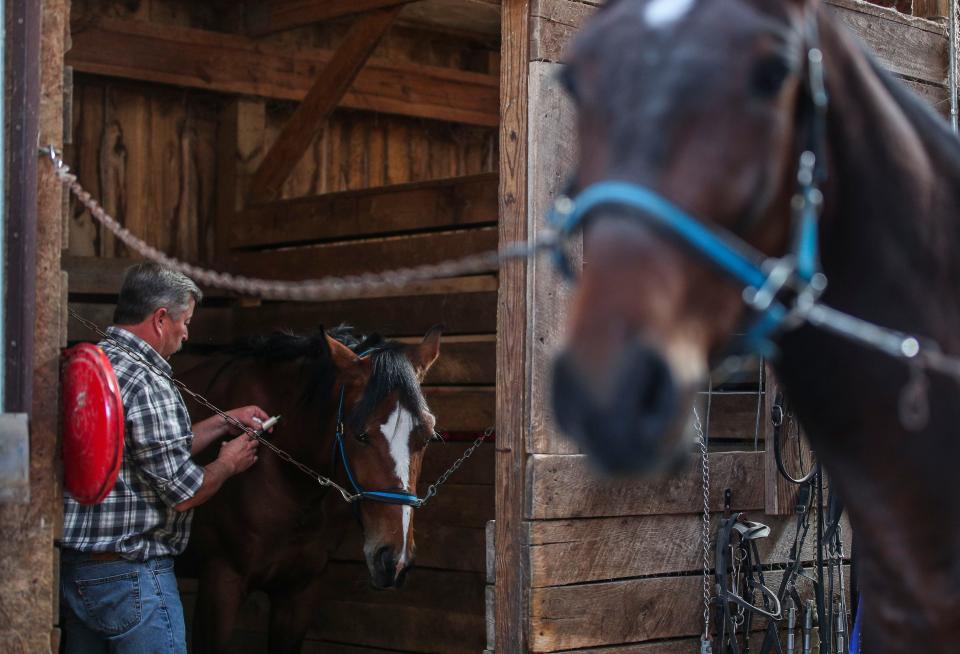
Dr. Andy Roberts, a Lexington-based equine practitioner and former racehorse regulatory veterinarian, who has been practicing for 30 years, spends much of his time traveling to treat patients in places such as Western Kentucky or Lebanon, Ohio, or even as far away as Florida.
All that travel cuts into his profits, and on paper, it’s not necessarily worth it. But if he doesn’t do it, there may not be anyone who will.
“You have to do it,” he said while reflecting on the state of the industry. “You have horses to take care of.”
What has changed in the equine vet industry over the last year?
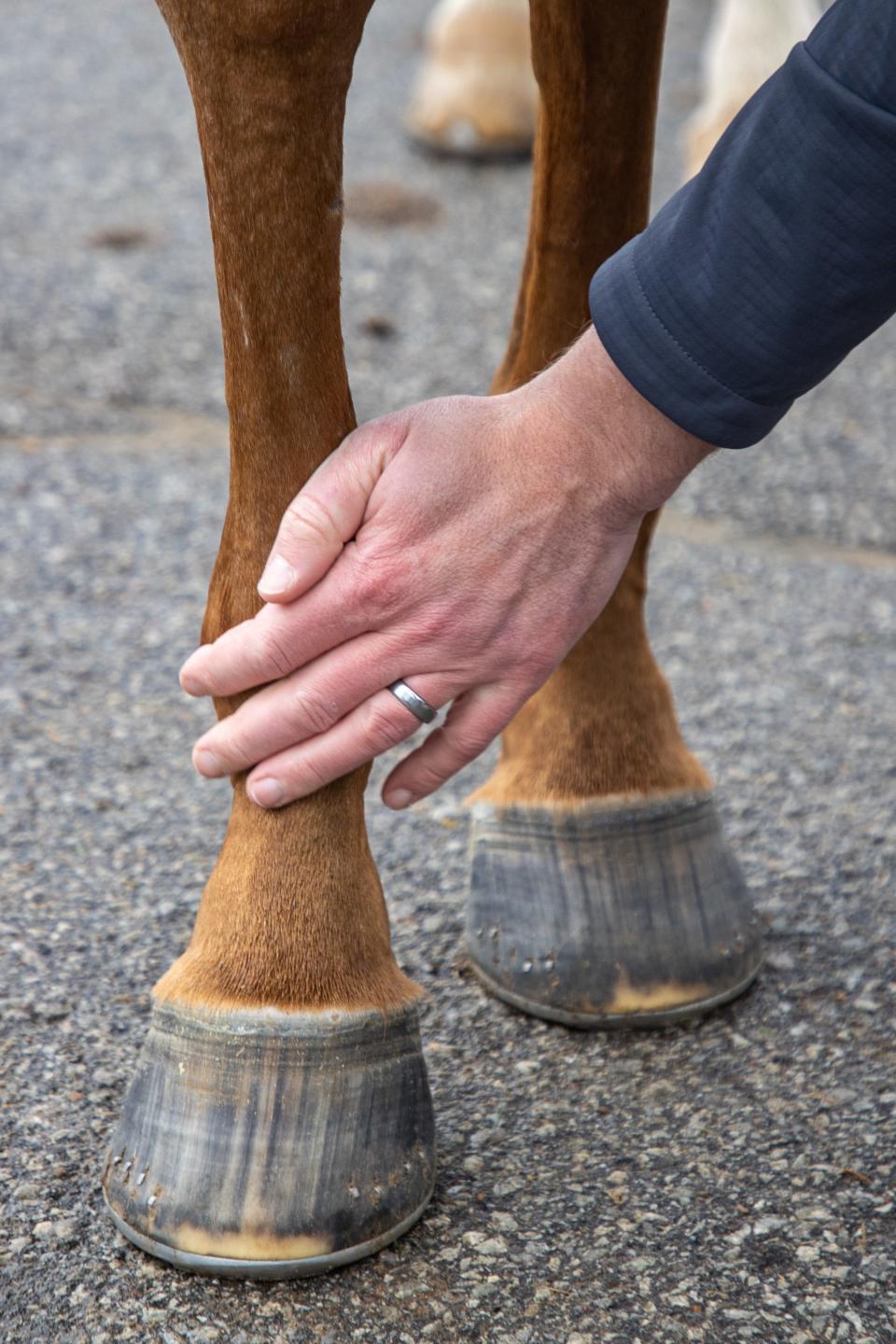
While there are many things the equine vet industry still needs to address to stifle the shortage, such as student debt load and long work hours, it's not all "doom and gloom" Garrett said.
The industry continues to be a major economic driver in Kentucky, generating $6.5 billion annually in economic activity and supporting roughly 60,000 jobs, according to the Kentucky Department of Agriculture, none of which would be possible without the dedication of veterinarians across the state.
As more visibility has been brought to the issue of the vet shortage and the long hours worked by equine vets, the industry saw "important progress in compensation levels" in 2023.
Equine vets have historically received the lowest starting salary of all vets, the AAEP and AVMA found. The 2023 average starting salary for equine vets reached roughly $94,000; however, this is still well below the more than $120,000 companion animal vets can expect to make.
And while that salary may sound appealing, one in three equine vets will graduate vet school with more than $220,000 in student loan debt, with many surpassing $300,000 in debt.
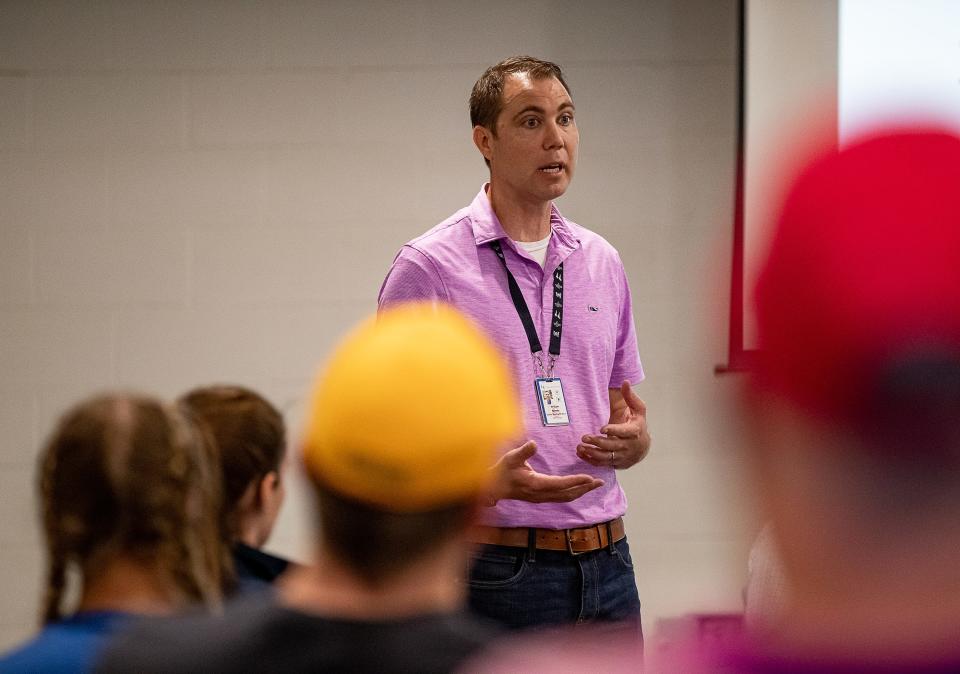
Along with the progress in starting pay, Brown noted last year saw the return of several programs aimed at recruiting and retaining students and young equine vets.
Farmer agreed, saying the increased programming from vet organizations aimed at perspective vets is crucial.
"It's been a struggle obviously on the equine side," Farmer said. "But we've got some really good initiatives ... on trying to figure out some realistic solutions to solve this problem as quickly as possible knowing that still, it’s a yearslong solution, not a monthslong solution."
All the while, Kentucky’s equine vets will keep tending to the horses that demand their attention.
“I'm a step slower than I was last year,” Roberts said. “Maybe a little more overweight than I was last year, but I'm gonna practice until I can't do it anymore.”
The Courier Journal completed much of this reporting during the 2023 racing seasons and conducted follow-up reporting in early 2024. Environmental reporter Connor Giffin contributed to this report. Contact reporter Olivia Evans at oevans@courier-journal.com or on Twitter at @oliviamevans_
This article originally appeared on Louisville Courier Journal: Every day is Kentucky Derby for Churchill Downs equine veterinarians

